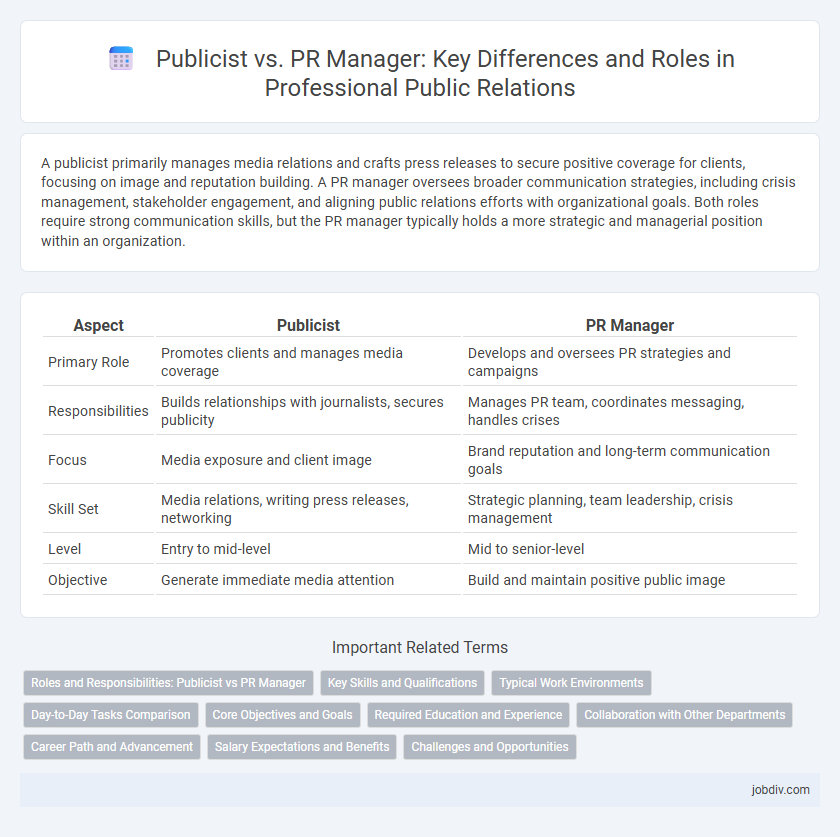A publicist primarily manages media relations and crafts press releases to secure positive coverage for clients, focusing on image and reputation building. A PR manager oversees broader communication strategies, including crisis management, stakeholder engagement, and aligning public relations efforts with organizational goals. Both roles require strong communication skills, but the PR manager typically holds a more strategic and managerial position within an organization.
Table of Comparison
| Aspect | Publicist | PR Manager |
|---|---|---|
| Primary Role | Promotes clients and manages media coverage | Develops and oversees PR strategies and campaigns |
| Responsibilities | Builds relationships with journalists, secures publicity | Manages PR team, coordinates messaging, handles crises |
| Focus | Media exposure and client image | Brand reputation and long-term communication goals |
| Skill Set | Media relations, writing press releases, networking | Strategic planning, team leadership, crisis management |
| Level | Entry to mid-level | Mid to senior-level |
| Objective | Generate immediate media attention | Build and maintain positive public image |
Roles and Responsibilities: Publicist vs PR Manager
Publicists primarily focus on managing media relations and securing positive press coverage to enhance a client's public image, often crafting press releases and coordinating interviews. PR Managers oversee broader strategic communications, including reputation management, crisis communication, and internal communication strategies, ensuring consistent messaging across multiple platforms. While publicists specialize in external visibility, PR managers integrate these efforts into a comprehensive public relations plan aligned with organizational goals.
Key Skills and Qualifications
Publicists excel in media relations, content creation, and crisis communication, demonstrating strong storytelling abilities and press release expertise. PR Managers possess advanced strategic planning, stakeholder engagement, and campaign management skills, often requiring proficiency in analytics and leadership. Both roles demand excellent communication, adaptability, and a deep understanding of brand messaging within the public relations industry.
Typical Work Environments
Publicists typically operate within media agencies, entertainment companies, and publishing houses, focusing on securing positive press coverage and managing media relations. PR managers work across diverse sectors including corporate firms, government agencies, and non-profits, overseeing broader communication strategies and stakeholder engagement. Both roles require collaboration with marketing teams, but PR managers often handle internal communications and crisis management in addition to media outreach.
Day-to-Day Tasks Comparison
Publicists primarily craft and distribute press releases, manage media contacts, and coordinate publicity campaigns to secure coverage for clients. PR managers oversee broader communication strategies, including crisis management, stakeholder engagement, and internal communications, ensuring consistent brand messaging across multiple channels. Both roles require media relations expertise, but publicists focus on external promotion while PR managers handle comprehensive public relations planning and execution.
Core Objectives and Goals
A Publicist primarily focuses on generating media coverage and managing a client's public image through strategic communication and press releases to enhance visibility. A PR Manager oversees broader reputation management, stakeholder engagement, and crisis communication strategies to maintain and strengthen the organization's overall public perception. Both roles aim to build positive relationships with the media and target audiences but differ in scope, with the PR Manager taking a more comprehensive approach to brand reputation.
Required Education and Experience
A publicist typically requires a bachelor's degree in public relations, communications, or journalism, coupled with experience in media relations and content creation to effectively manage publicity campaigns. PR managers often hold a similar degree but need additional years of experience in strategic communication, crisis management, and team leadership to oversee comprehensive public relations strategies. Both roles benefit from internships or entry-level positions to build industry-specific skills and professional networks.
Collaboration with Other Departments
Publicists and PR Managers both collaborate extensively with marketing, sales, and executive teams to align communication strategies with overall business objectives. Publicists concentrate on media relations and content creation to enhance brand visibility, requiring close coordination with creative departments and event planners. PR Managers oversee integrated campaign planning and internal communications, ensuring consistent messaging and fostering collaboration across multiple departments for cohesive public relations efforts.
Career Path and Advancement
Publicists typically specialize in managing media relations and securing press coverage, often starting as assistants or coordinators before advancing to senior publicist roles. PR Managers oversee broader strategic communications, including crisis management and brand messaging, progressing from PR specialist or account executive positions to director or communications manager roles. Career advancement in PR management generally offers greater leadership opportunities and higher salary potential compared to publicist positions.
Salary Expectations and Benefits
Publicists typically earn salaries ranging from $45,000 to $75,000 annually, depending on experience and industry, while PR managers command higher wages between $70,000 and $120,000 due to their strategic roles. Benefits for PR managers often include performance bonuses, stock options, and comprehensive health plans, reflecting their leadership responsibilities. Publicists usually receive standard benefits such as health insurance and paid time off but have fewer incentives tied to company performance.
Challenges and Opportunities
Publicists face challenges in securing consistent media coverage and managing rapid reputation shifts, while PR managers navigate complex stakeholder relationships and strategic communications across multiple platforms. Publicists have the opportunity to build strong media networks and leverage storytelling skills to amplify individual or brand presence. PR managers can capitalize on data analytics and integrated marketing strategies to shape broader organizational narratives and drive sustained brand growth.
Publicist vs PR Manager Infographic

 jobdiv.com
jobdiv.com